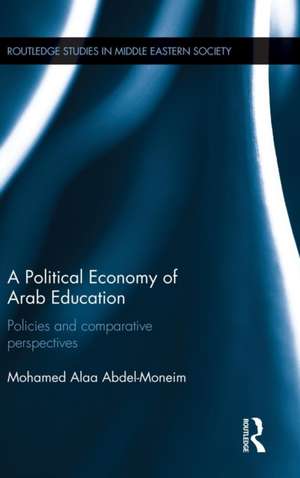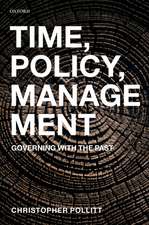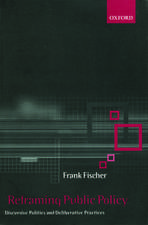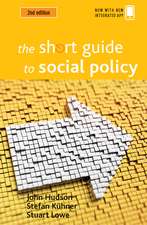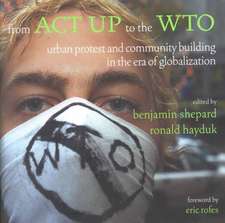A Political Economy of Arab Education: Policies and Comparative Perspectives: Routledge Studies in Middle Eastern Society
Autor Mohamed Alaa Abdel-Moneimen Limba Engleză Hardback – 8 sep 2015
A Political Economy of Arab Education offers a comprehensive analysis of K-12 education systems in Arab countries, deepening understanding of their administrative structures and outcomes, and exploring how political considerations have impacted the ability of Arab regimes to engage in meaningful reform. Taking a unique comparative political economy perspective, it examines the reasons behind policy stagnation in Arab countries, addressing the effects of size, history and political stability on the design and implementation of policies and administrative structures. Its informed analysis and comparison of education systems provides new insight into Arab regimes and highlights factors pulling them towards either stagnation or reform. Examining the sustainability of reforms and establishing the benefits of engaging in meaningful change, this book sheds light on why some regimes survived the Arab Spring while others crumbled and formulates convincing predictions on the potential for future regime change in the region.
This book will be of key interest to students and scholars of Middle Eastern Studies, International and Comparative Education and Development Studies.
| Toate formatele și edițiile | Preț | Express |
|---|---|---|
| Paperback (1) | 386.61 lei 6-8 săpt. | |
| Taylor & Francis – 12 dec 2019 | 386.61 lei 6-8 săpt. | |
| Hardback (1) | 1057.09 lei 6-8 săpt. | |
| Taylor & Francis – 8 sep 2015 | 1057.09 lei 6-8 săpt. |
Preț: 1057.09 lei
Preț vechi: 1289.13 lei
-18% Nou
Puncte Express: 1586
Preț estimativ în valută:
202.30€ • 210.42$ • 167.01£
202.30€ • 210.42$ • 167.01£
Carte tipărită la comandă
Livrare economică 14-28 aprilie
Preluare comenzi: 021 569.72.76
Specificații
ISBN-13: 9781138821071
ISBN-10: 1138821071
Pagini: 268
Ilustrații: 11 black & white illustrations, 32 black & white tables, 11 black & white line drawings
Dimensiuni: 156 x 234 x 20 mm
Greutate: 0.52 kg
Ediția:1
Editura: Taylor & Francis
Colecția Routledge
Seria Routledge Studies in Middle Eastern Society
Locul publicării:Oxford, United Kingdom
ISBN-10: 1138821071
Pagini: 268
Ilustrații: 11 black & white illustrations, 32 black & white tables, 11 black & white line drawings
Dimensiuni: 156 x 234 x 20 mm
Greutate: 0.52 kg
Ediția:1
Editura: Taylor & Francis
Colecția Routledge
Seria Routledge Studies in Middle Eastern Society
Locul publicării:Oxford, United Kingdom
Public țintă
Postgraduate and UndergraduateCuprins
Introduction 1 The First Story: Education that doesn’t pay! 2 The Second Story: The History Story Independence, Oil, and Political Stability 3 The Third Story: Incentives Who Wants Reform and Why? Or Why Not? 4 The Fourth Story: The Story of Reform A Framework 5 The Fourth Story: The Story of Reform (Continued) The Slow and the Swift 6 Conclusion The Arab Awakening, Authoritarianism, and Policy Reforms in Arab Countries
Descriere
A Political Economy of Arab Education offers a comprehensive analysis of K-12 education systems in Arab countries, deepening understanding of their administrative structures and outcomes, and exploring how political considerations have impacted the ability of Arab regimes to engage in meaningful reform. Taking a unique comparative political economy perspective, it examines the reasons behind policy stagnation in Arab countries, addressing the effects of size, history and political stability on the design and implementation of policies and administrative structures. Its informed analysis and comparison of education systems provides new insight into Arab regimes and highlights factors pulling them towards either stagnation or reform. Examining the sustainability of reforms and establishing the benefits of engaging in meaningful change, this book sheds light on why some regimes survived the Arab Spring while others crumbled and formulates convincing predictions on the potential for future regime change in the region.
